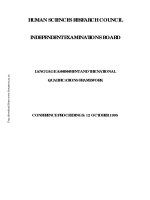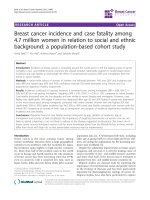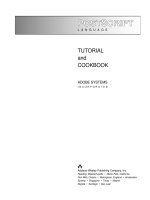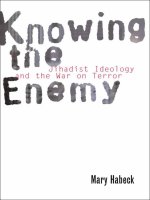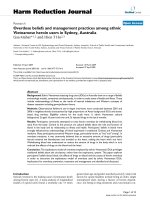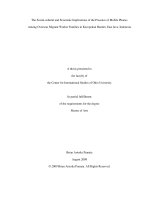Language ideology and linguistic investment among korean educational migrant families in singapore
Bạn đang xem bản rút gọn của tài liệu. Xem và tải ngay bản đầy đủ của tài liệu tại đây (2.3 MB, 270 trang )
LANGUAGE IDEOLOGY AND LINGUISTIC INVESTMENT
AMONG KOREAN EDUCATIONAL MIGRANT FAMILIES
IN SINGAPORE
BAE SO HEE
(M.A. in English Language, National University of Singapore)
A THESIS SUBMITTED
FOR THE DEGREE OF DOCTOR OF PHILISOPHY
DEPARTMENT OF ENGLISH LANGUAGE AND LITERATURE
NATIONAL UNIVERSITY OF SINGAPORE
2014
i
Acknowledgements
This thesis was made possible only through the generous help and support of many
people. I would like to gratefully acknowledge the diverse support I have received.
First, I wish to acknowledge the families who participated in my study, sharing their
lives and thoughts with me. In particular, the three mothers in my study generously
worked with me as informants and close friends, providing endless help. I am also
thankful for the children who spent their precious time on working and studying with
me. Their thoughts and voices provided me with insights that I otherwise could never
have. I would like to thank the fathers in my study who took time out of their busy
schedule to share their stories and views.
I would like to express my deep gratitude to my supervisor, Associate Professor
Joseph Sung-Yul Park, who has always been supportive and encouraging at each
stage of my graduate career. I have been immensely inspired by his boundless
enthusiasm and precision for his work. I really appreciate his close reading of my
writing and the thought-provoking comments he always makes. I am also grateful to
Dr. Mie Hiramoto and Dr. Sunita Abraham for their helpful comments and
suggestions on the earliest draft of this thesis.
I have benefited from the friendship and support of many friends in NUS. My
warmest thanks go to Hwang Eunshil for being a good friends and advisor all
throughout my graduate years. She made this academic journey full of joy and
happiness with her warm heart and friendship. I am especially grateful to her for her
help with the technical part of the thesis production. I also would like to thank Yurni
and Shuang for their helpful comments about my early drafts, warm support, and
friendship. Many thanks go to the members of Graduate Student Reading Group who
ii
provided me with a vital academic community.
I am thankful to my family in Korea, my parents, Bae Sung Wan and Jang Sung Ja for
their lifelong support and love. I am also grateful to my parents-in-law, Jung Kyu In
and Lee Jong Rye who always trust me and worry about my health. Without their
encouragement and emotional support, this work was not possible.
Last but not least, my deepest gratitude goes to my loving husband, Myung-Jin who
has been unfailing in his support. I have no words to express how grateful I am to him
for his love and believing in me. He has been my faithful companion and I am so
happy to have him by my side always. My two sweethearts, Euna and HaeSung have
been the joy and energy of my life. I really thank them for being such a great son and
daughter of mine who expressed deep love for me and encouraged me whenever I felt
tired and down. Without the unconditional love of my family, I could not have
completed this work. Thank you for everything, my loved ones.
iii
TABLE OF CONTENTS
Acknowledgements i
Table of Contents iii
Summary vii
CHAPTER 1 1
TRANSNATIONAL EDUCATIONAL MIGRATION AS
SCOCIOLIGUISTIC PRACTICE
1.1 Introduction 1
1.2 Research questions and significance of study 5
1.3 Theoretical framework 8
1.3.1 Sociolinguistics of globalization 9
1.3.1.1 Mobility and linguistic resources 9
1.3.1.2 Multiple scales of TimeSpace 12
1.3.2 Multilingualism in globalization 14
1.3.2.1 What is the desirable form of multilingualism in
globalization? 14
1.3.2.2 Language as commodity and language as identity 18
1.3.3 Linguistic investment 23
1.3.4 Language and neoliberalism in globalization 26
1.4 Overview of the chapters 30
CHAPTER 2 34
TRANSNATIONAL EDUCATIONAL MIGRATION: KOREAN
JOGI YUHAK FAMILIES IN SINGAPORE
2. 1 Introduction 34
2. 2 Monolingual Korea in pursuit of multilingualism 35
2.2.1 Ideological construction of monolingualism in South Korea 35
2.2.2 Yongyeo yeolpung (English frenzy) in Korea 40
2.2.3 A war for more linguistic resources for better competitiveness 43
2.3 Jogi yuhak in South Korea 47
2.3.1 Historical and social perspectives on Korean jogi yuhak 47
2.3.2 Previous research on transnational educational migration 51
2.4 Singapore as an alternative destination for Korean jogi yuhak 58
2.4.1 What does ‘alternative’ mean to Korean jogi yuhak families? 58
2.4.2 Singapore as an ideal ‘alternative’ location for the development of
global elite 60
2.4.3 Anxieties over an ‘alternative’ choice 62
2.4.4 Ambivalence of ‘alternative’ choice 66
2.5 Conclusion 68
iv
CHAPTER 3 70
RESEARCH METHODOLOGY
3.1 Ethnography as research methodology 70
3.1.1 Ethnographic approach to sociolinguistics of globalization 70
3.1.2 The current study: sociolinguistic ethnography with qualitative
research methodology 73
3.2 The participant families 76
3.2.1 Jogi yuhak families as transnational migrants 76
3.2.2 Recruitment of the families 80
3.2.3 Socio-economic background of the families 82
3.2.4 The families 85
3.2.4.1 Minsu’s family 85
3.2.4.2 Juni’s family 88
3.2.4.3 Jaemin’s family 90
3.3 Data collection 93
CHAPTER 4 98
LANGUAGE AND INVESTMENT: STRATEGIES OF
LINGUISTIC INVESTMENT IN TRANSNATIONAL SPACE
4.1 Introduction 98
4.2 Linguistic investment strategies of the three families 101
4.2.1 Investment in English 101
4.2.1.1 The families’ strategies of linguistic investment for
attaining ‘good English’ 102
4.2.1.2 English as a necessity 104
4.2.1.3 Discrepancy between the ideal and the reality of
language learning 110
4.2.1.4 Investment in Singlish 112
4.2.2 Investment in Mandarin 117
4.2.2.1 More linguistic resources for better competitiveness 117
4.2.2.2 Material constraints in acquiring additional linguistic
resources 120
4.2.3 Investment in Korean 122
4.2.3.1 Language as commodity vs. language as identity 122
4.2.3.2 Dilemma in language learning: acquiring foreign
languages at the cost of mother tongue 125
4.3 Conclusion 129
v
CHAPTER 5 132
LANGUAGE AND IDEOLOGY: MULTIPLE LANGUAGE
IDEOLOGIES ABOUT LOCAL VARIETIES OF ENGLISH
5.1 Introduction 132
5.2 Monolingualism orientation 137
5.2.1 Singlish as cheap English 137
5.2.2 The families’ strategies to avoid Singlish 142
5.3 Multilingualism Orientation 147
5.3.1 Learning how to use different Englishes 147
5.3.2 The families’ positive evaluation of Singlish 151
5.4 Stratified multilingualism orientation 155
5.4.1 Stratification of linguistic resources in multiple TimeSpaces 155
5.4.2 Complexity of language ideologies in transnational movement 159
5.5 Conclusion 164
CHAPTER 6 167
LANGUAGE AND IDENTITY: FLEXIBLE IDENTITY
THROUGH MULTILINGUALISM
6.1 Introduction 167
6.2 The ideal of flexible global identity 171
6.2.1 Language learning as economic activity 171
6.2.2 “It was weird to speak Korean to my Korean friend”: Detaching
language from identity 174
6.2.3 “Korea is no more than a place where I was born”: Flexible sense of
belonging? 177
6.3 Limits of flexible identity 182
6.3.1 Social exclusion in transnational space 182
6.3.2 “We cannot deny that we are Koreans”: Conflicting ideologies
about language and identity in language learning 186
6.4 Renegotiating the ideal of flexible transnational identity 190
6.5 Conclusion 196
CHAPTER 7 198
LANGUAGE AND INSECURITY: ANXIETY AND PRECARITY
IN THE NOELIBERAL PURSUIT OF GLOBAL SUCCESS
7.1 Introduction 198
7.2 Anxiety in the pursuit of neoliberal subjectivity through language
learning 200
7.3 Anxieties in transnational movement 204
7.3.1 Anxiety over Time – Minsu’s family 205
7.3.2 Anxiety over Space – Juni’s family 212
7.3.3 Anxiety over the relativity and complexity of multiple TimeSpace –
Jaemin’s family 217
7.4 Conclusion 226
vi
CHAPTER 8 228
CONCLUSION
8.1 Language and mobility in neoliberal globalization 228
8.2 Implications for further study 236
8.2.1 A critical sociolinguistics of globalization 236
8.2.2 Language learning and teaching in neoliberal globalization 238
REFERENCES 244
vii
Summary
This thesis examines the effects of globalization and transnational movement on
language through a 2.5-year ethnographic study on three Korean educational migrant
families in Singapore. The thesis explores how language ideology is reflected in and
constructed by the families’ everyday experiences of language learning and
transnational life through the analysis of their strategies of linguistic investment and
the process of constructing transnational identity.
This thesis aims to investigate complex language ideologies embedded in
various linguistic and educational choices of the families during their transnational
migration and to identify social and material constraints which affect those choices. I
examine the strategies of linguistic investment of the families, their ambivalent
attitudes towards local varieties of English and complex ideologies about English, the
families’ pursuit of global subjectivity of the children through language learning, and
the anxieties and insecurities which the families experienced during their educational
migration in Singapore. Through the analysis of the sociolinguistic practices and
transnational experiences of the families who move and imagine their movement
across various places in transnational space, I show how the multi-scalar dimensions
of sociolinguistic practices in globalization account for the complex interrelationship
between language and mobility.
As Korean educational migrant families move across different locations in
transnational space, they encounter various difficulties and problems in acquiring
valuable linguistic resources and attaining the ideal global subjectivity of the children
through educational migration. Constantly changing conditions of living and learning
throughout transnational movement require the families to continuously reconfigure
and renegotiate the meanings and values of their resources in various spaces at
different points in time. The families orient to the complex networks of value that
viii
form across multiple linguistic as well as educational markets as they explore the best
opportunities for the children in search of useful resources. As Korean transmigrant
families orient simultaneously to the expectations of multiple scales of TimeSpace,
the families continuously readjust to different resources, systems, experiences, and
expectations embedded in each location along their migratory trajectories, modifying
the strategies of linguistic investment and developing more complex ideologies about
language and identity. Korean transmigrant families' awareness of the complex and
indeterminate relationship between language and space often leads to anxiety about
the ambivalence and complexity of language in society, as they try to prepare for the
uncertain future in the rapidly transforming global society. By exploring the complex
way in which Korean transmigrant families construct the ideologies about language
and identity in transnational space, this thesis highlights the tensions and
contradictions underlying sociolinguistic practices in the context of transnationalism
and neoliberal globalization.
The thesis argues that polycentricity in globalization and transnationalism
highlights the complexity and multiplicity of language ideologies in which people
constantly negotiate between competing ideologies about language and identity in
neoliberal globalization. The increasing mobility of people and resources in
globalization leads to intensifying anxiety and insecurity among language learners by
complicating the way in which language is perceived and mobilized by individuals
who strive to survive and succeed in neoliberal transformation of globalization.
1
Chapter1
Transnational educational migration as sociolinguistic practice
1.1 Introduction
As I have worked in a Korean bank and also in a few overseas branches
for over 15 years, I feel that Korean corporations are far behind others, I
mean, the ones in the US or Europe. We always introduce new financial,
management, or marketing systems from them, paying enormous money.
Korea is not yet globalized that much. The biggest hindrance to
globalization in Korea is, of course, language, English. … I want my son
to be someone who leads the change and development, not just following
others’ instruction. I want him to instruct and lead others. … To do that,
the first thing he has to do is to speak fluent English, to the level of a
native speaker. … But nowadays English is the very base. He needs to
learn other foreign languages such as Mandarin. … I believe that his
overseas experience, living and studying in foreign countries and meeting
various people who are from different countries, and use different
languages, all of this will help him to have global flexibility or a
cosmopolitan outlook.
1
(Jaemin’s father, Semptember 2010)
This is how the father of one of the participant families of this study narrated his
desire and expectation for the education of his own child. According to him, in order
to develop his child as a global elite, who leads innovation and succeeds in the global
stage, acquisition of multilingual competence, including competence in the global
language of English, as well as multicultural knowledge is a foremost important task.
1
All translations from Korean are by the author.
2
However, acquisition of these resources is thought to be very difficult in the
monolingual and monocultural society of South Korea in which access to these
valuable resources is considered limited. Therefore, in order to provide the children
with the opportunities to inculcate valued linguistic and social resources, many
Korean families decide on transnational migration to locations which will enable
them to have easy and privileged access to these resources, spending a large portion
of family income on their children’s education. The parents make huge investment in
their children’s education, enduring the difficulties of family separation, sometimes
giving up their occupational opportunities, and bearing enormous financial burden to
pay high educational fees and living cost abroad.
Transnational educational migration of pre-university students in South Korea is
called jogi yuhak,
2
which literally means ‘early study abroad’. Among many Korean
middle class families, jogi yuhak has become a popular educational strategy for the
children to acquire necessary resources for the fierce competition in the globalizing
neoliberal world. Among these necessary resources to be attained, linguistic resources,
most saliently English and increasingly additional foreign languages such as
Mandarin Chinese, are thought to be the most important and basic resources for
survival and success in global competition. Thus, Korean families make enormous
investment in language learning and they move across transnational spaces, looking
for the locations which can facilitate effective acquisition of valuable linguistic
resources. In this regard, transnational educational migration of Korean middle class
families is deeply related to not only social factors in Korea but also various language
issues in globalization such as multilingualism and neoliberalism (Park and Lo 2012;
Lo, Abelmann, Kwon, and Okazaki forthcoming).
Through jogi yuhak, Korean middle class families aim to provide opportunities
for their children to acquire multilingual competence at their early stages of life. The
2
Romanization of Korean in this thesis follows the Revised Romanization system.
3
families are concerned about what kind of linguistic resources they need in order for
their children to succeed in the rapidly changing global world as well as in the
neoliberal social transformation of Korean society. Since accumulation of linguistic
resources is the prominent purpose of Korean families’ transnational educational
migration, and since the families need to engage in multilingual interaction in their
transnational movement, language is one of the most crucial factors which influence
the transnational experiences of Korean educational migrant families. The pursuit of
multilingualism through transnational migration is also deeply rooted in neoliberal
ideology. Transnational educational migration of Korean families are not for mere
linguistic attainment or preparedness for current and future competition, but more
fundamentally a serious pursuit of neoliberal subjectivity in the globalized neoliberal
economy (Park 2010), which is characterized by continuous reworking and
improvement of the self (Walkerdine 2006).
However, transmigrant families’ movement across social spaces and ideological
boundaries casts various challenges and conflicts. As Korean families move across
different locations in transnational space, they encounter various difficulties and
problems in acquiring valuable linguistic resources and attaining the ideal global
subjectivity of the children through educational migration. Constantly changing
conditions of living and learning throughout transnational movement require the
families to continuously reconfigure and renegotiate the meanings and values of their
resources in various spaces at different points in time. As they explore the best
opportunities for the children in search of useful resources, the families orient to the
complex networks of value that form across multiple linguistic as well as educational
markets. Orienting simultaneously to the expectations of multiple locations of their
educational migration, Korean transmigrant families continuously modify their
strategies of linguistic investment and develop more complex ideologies about
language and identity. Korean transmigrant families' awareness of the complex and
4
indeterminate relationship between language and space often leads to anxiety about
the ambivalence and complexity of language in society, as they try to prepare for the
uncertain future in the rapidly transforming global society.
In this sense, the case of Korean educational migrant families serves as a good
site for exploring intensifying complexity of the relationship between languages and
society by illuminating how increasing mobility of people and resources across
geographical and cultural boundaries influences the ideologies about language in
globalization. As globalization and diversity has become an unavoidable change that
everyone has to face in one’s everyday life, we need to address the questions not only
about how globalizing forces influence individual’s life but also about how
individuals interpret and interact with globalizing forces in local context of everyday
life. As Glick Schiller, Basch and Szanton Blanc (1995) point out, transnational
processes are not only directed by global forces but located within the life experience
of individuals and families.
In this regard, the goal of this thesis is to understand the complex relation
between language practice and social structure in globalization by taking a deeper
look at micro-level individual’s practice in transnational space. This thesis examines
the effects of globalization and transnational movement on sociolinguistic practices
and language ideologies of transmigrants with a focus on three Korean jogi yuhak
families in Singapore. Through a 2.5-year ethnographic study on Korean families in
Singapore, this thesis discusses sociolinguistic practices in the context of
transnationalism, highlighting how transnational experience and conditions influence
the construction of language ideology and transnational identity, with respect to
mobility of people and resources in the globalizing world.
Through an analysis of strategies of linguistic investment and the process of
constructing transnational identity, this thesis demonstrates how Korean jogi yuhak
families’ everyday experiences of language learning and transnational life reflect and
5
(re)construct their language ideology. By doing so, this study highlights the tensions
and contradictions underlying sociolinguistic practice in the context of
transnationalism and neoliberal globalization.
1.2 Research questions and significance of study
This thesis attempts to address several issues raised by Korean jogi yuhak practices in
multilingual and multicultural context of Singapore. I conducted a 2.5-year
ethnographic study of three jogi yuhak families in Singapore who show various
educational and linguistic investment strategies. By examining these transnational
migrant families who have various transnational experiences and well-articulated
plans for their future migratory trajectories, I attempt to provide a more explanatory
account of sociolinguistic practices in transnationalism and globalization.
For this, I explore four different aspects of Korean jogi yuhak families’
language learning practices, which are presented in four different themes of
investment, ideology, identity, and insecurity. These four themes are the most salient
issues which emerge from my analysis of ethnographic data of the Korean families’
language practice in their educational migration in Singapore and they point to the
contradictions and conflicts which the families encountered in their pursuit of
multilingual skills in transnational space.
First, Korean jogi yuhak families’ language learning can be viewed as their
serious ‘investment’ in language. The families develop highly sophisticated strategies
of linguistic investment for effective acquisition of multilingual competence. As the
families engage in multilingual and multicultural interactions in Singapore, their
strategies of language learning continue to change and this change is shaped by their
constant negotiation between various constraints in local context of language learning
as well as their careful calculation of the value of linguistic resources in global
6
context.
Second, the Korean families’ strategies of linguistic investment are deeply
related to complex ‘ideologies’ about language which the families construct through
language learning practices in a specific location. As the families deploy various
strategies of linguistic investment, they also develop very complex and ambivalent
ideologies about language, specifically about English, which is the main focus of
their linguistic investment. The sociolinguistic complexity of Singapore which
provides both global and local varieties of English leads the families to recognize the
relative relation between different varieties of English language, resulting in the
families’ ambivalent attitude towards local varieties of English in Singapore.
Third, the children’s complex language learning process in transnational space
has great influence on the construction of the children’s transnational identity. In fact,
many jogi yuhak families expect that their children can attain flexible transnational
identity through acquisition of multilingual competence. However, the families face
various problems and dilemmas in pursuing the children’s global flexibility, which
constantly required them to negotiate the meaning of ‘flexible identity’ in different
locations in their migratory trajectories.
Fourth, ‘insecurity’ is the most salient emotion throughout the families’
educational migration. As the families continuously experience various contradictions
and conflicts in their language learning, they feel more insecure about the possibility
of the children’s future global success through enormous investment in language
learning. Rather than getting more confident by gaining good multilingual
competence, which the families expected at the beginning stage of their educational
migration, they became more anxious and insecure about the value of the linguistic
resources that the children acquired through educational migration. By focusing on
the analysis of affective aspect of Korean jogi yuhak families’ language practice, I
intend to illuminate how micro-level individual’s affect in language learning is, in
7
fact, complexly connected to the macro-level social structure.
I provide a brief summary of the four main issues of this thesis and sets of
research questions related to each issue below.
(a) The strategies and patterns of linguistic investment of Korean jogi yuhak
families in Singapore, with a focus on their effort to attain multilingual
competence in three languages of English, Mandarin, and Korean: how
do jogi yuhak families distribute their material resources and time in
learning different languages, and what is their rationale for investing
differently in each language? How do jogi yuhak families negotiate their
linguistic investment strategies and what are the consequences?
(b) Korean jogi yuhak families’ ambivalent attitudes towards and shifting
ideologies about varieties of English language: how does Korean jogi
yuhak families’ attitude towards local varieties of English change during
their educational migration in Singapore and what are the factors which
cause the change? How do the polycentricity and mobility influence the
way in which the families evaluate the values and functions of different
linguistic resources?
(c) Transnational identity of the children, which are constructed and
strategically pursued in the process of language learning through
transnational migration: what are the material and social constraints the
families face in pursuing the children’s flexible identity and how do they
respond to those constraints? What kinds of strategies do they employ in
negotiating the children’s desirable transnational identity as global elite?
What are the tensions and contradictions the families experience in the
construction of flexible transnational identity of the children?
8
(d) Korean jogi yuhak families’ anxiety over the complexity and
contradictions in transnational educational migration: what are the
factors which cause the anxieties of jogi yuhak families during
transnational educational migration? How does the fierce pursuit of
neoliberal subjectivity through global mobility work to increase the
anxieties and insecurities of the families?
Through the examination of the Korean jogi yuhak case, this research intends to
highlight the significant impact of mobility on language. Korean jogi yuhak families’
continuous movement for more effective attainment of valuable linguistic resources
implies constant negotiation between competing ideologies about language and
society as they deal with various conflicts and dilemmas in language learning in
different places at different points of time. The families’ global aspiration is often
constrained by the locality of specific migratory location which imposes certain
norms and orders on their sociolinguistic practices. At the same time, the families’
actual everyday experiences in a specific location work to reformulate dominant
ideologies about global language which initiated the families’ movement for the
search for linguistic resources with global credentials. Thus, this research focuses on
investigating how Korean jogi yuhak families, as highly mobile agents who actively
participate in globalization process, interpret the meaning of language in globalization
and how they actualize globalization processes in their everyday language learning in
their transnational movement.
In this sense, this ethnographic case study of three jogi yuhak families in
Singapore has several implications for the sociolinguistics of globalization. First, it
serves as a good illustration of the effect of mobility and polycentricity on language
in the sense that the families move across and imagine their movement in various
geographical locations including Korea, Singapore, and their future destinations,
9
English-speaking Western countries, all of which have a hierarchical relationship to
one another and present different norms and expectations. Second, reflecting the
recent ‘significant rethinking of multilingualism and its consequences for identity’
(Park and Lo 2012, 149) that is taking place in the sociolinguistics of globalization, it
examines the way in which the families make sense of multilingual interactions in
actual language learning processes in the multilingual and multicultural context of
Singapore, as well as their impact on the construction of transnational identity. In
addition to this, the in-depth ethnographic approach adopted by this study contributes
to our understanding of the tensions and contradictions that underpin matters of
transnational migration and multilingualism by illuminating how micro-level
individuals’ practices and ideologies are connected to macro-level social structure and
dominant ideologies. In particular, it demonstrates the process of continuous
negotiation in the families’ ideologies about language and society in relation to their
changing social position in multiple spaces they move across through transnational
migration. The data from longitudinal observation of the families’ sociolinguistic
practices in this study helps us see more clearly how individual language uesers
negotiate between multiple ideologies by demonstrating the specific ways in whch the
families interact with various conditions and constraints on language learning and
identity construction in transnational space over time.
In summary, this thesis adds to the development of new approaches to the
sociolinguistic study of globalization by employing an empirical approach into the
complexities of sociolinguistic practices in globalization. The focus on real-life
experiences and practices of individual agents is expected to highlight the
connections between micro-level individuals’ practices and macro-level social
structure, enhancing our understanding of what multilingualism and diversity means
to people in the globalizing world. In order to understand Korean jogi yuhak as
sociolinguistic practices in the context of globalization and transnationalism, this
10
thesis draws on recent development in the linguistic anthropological work on
migration, transnationalism, and globalization, and sociolinguistically–oriented
applied linguistic research on language, identity and investment. Methodologically,
this study adopts the qualitative research method of ethnographic case study which
includes participant observation and ethnographic interviews. The details of research
methodology and background of research participants will be explained in chapter 3.
1.3 Theoretical framework
In this section, I outline the theoretical framework of this study by outlining various
issues in the discussion of language and globalization which need to be considered in
studying transnational educational migration. First, I discuss the importance of the
key concepts in the sociolinguistics of globalization that help us understand the
changing meaning and value of language in globalization and transnationalism. Then,
I present an overview of discussions about the shifting ideologies about
multilingualism highlighted by increasing diversity in the global economy. I also
explain the notion of ‘linguistic investment’, a key focus of analysis for this research,
and how it is related to the construction of language ideology and identity in
globalization. I then present neoliberalism as an ideology that motivates the Korean
families’ pursuit of multilingualism and global subjectivity. The discussion of these
sociolinguistic issues in globalization provides a basis for our understanding of the
dynamic role and meaning of language in globalization presented in the case of
Korean families’ transnational educational migration.
1.3.1 Sociolinguistics of globalization
1.3.1.1 Mobility and linguistic resources
11
Mobility is a key word which characterizes the process of globalization, which
includes the global flow of people, languages, cultures and technology. The study of
transnational migration allows us to investigate the way in which transnational
movement of people, resources, and ideas has intensified global interconnectedness
through the increasing contact between different languages and cultures it introduces.
This produces the need to redefine the meaning of space and time in globalization
through the dynamics of deterritorialization and reterritorialization, in which borders
and boundaries are contested and transgressed (Jacquemet 2005). Transnationalism
highlights the interplay between global and local processes and the reconstitution of
local positioning within global flows (Jacquemet 2005; Glick Schiller, Basch, and
Szanton Blanc 1995; Rockefeller 2011). Hannam, Sheller and Urry (2006)
conceptualize the contemporary round of globalization as a complex mobility system
and interconnected patterns of economic and social life in terms of both space and
time. This complex mobility system has brought about a more complex and
multiscalar image of political-economic space (Hannam, Sheller and Urry 2006) .
With increasing significance of mobility in globalization, mobility of language
has become a central issue in the sociolinguistics of globalization (Blommaert 2010;
Blommaert and Rampton 2011; Coupland 2010). Blommaert (2010) points out that
the mobility of language as resource has resulted in a shift in sociolinguistic
perspectives, from language as an independent and autonomous system to language
as social practice to language as mobile resource. Kroon, Dong, and Blommaert
(2011) assert:
In a globalizing world, we need to consider language as a complex of
mobile resources. Shaped and developed both because of mobility – by
people moving around – and for mobility – to enable people to move
12
around. (1)
Blommaert (2010) argues that the sociolinguistics of globalization should be a
sociolinguistics of mobile resources, stressing the importance of mobility as a central
theoretical concern. According to him, the perspective of language as mobile
resource is framed in terms of transnational networks, flows and movement,
constructing language as something closely connected to processes of globalization
(Blommaert 2010).
The experiences of transnationalism present an important site for the
sociolinguistics of mobile resources, since language is an importance key which
mediates transnational experiences in the sense that transmigrants need to engage in
complex negotiation of the meaning and value of languages in various spaces to make
sense of their transnational movement and shifting senses of identity (Park and Lo
2012). Moreover, the mobility of linguistic resources should be understood with
reference to various spatiotemporal scales in real sociocultural, historical and political
context. Transnational migrants orient to different geographical and ideological
spaces simultaneously, exploring the best opportunities and possibilities available to
themselves. Thus, their choices in transnational space are always based on a complex
process of negotiation between conflicting ideologies in various scales and contexts.
Due to this inherent polycentricity (Blommaert 2007, 2010) of transnational
movement, the judgment and evaluation about the value of linguistic resources is
always unstable and unpredictable. Here, polycentiricity can be understood a key
feature of sociolinguistic environment, refering to the multiple centers and norms to
which individuals need to orient and belong (Blommaert 2005, 2010).
A relevant notion for exploring language practices in the polycentric context of
transnational migration is the multiplicity of linguistic markets. According to
Bourdieu (1984, 1991), social and linguistic practices are constructed within multiple
13
and hierarchically embedded markets. The value of linguistic resources is attributed
according to the particular system of the market that is governed by practical relations
of power. Linguistic markets, like educational and occupational market, function
through unification, reproducing the legitimacy and power of certain linguistic
resource over others. Park and Wee (2009) use Bourdieu’s notion of linguistic market
in interpreting the multiplicity of the global linguistic market, deconstructing
Kachru’s Three Circles model of World Englishes (Kachru 1986). They view each
circle of the Inner Circle, the Outer Circle, and the Expanding Circle as representing a
different hierarchical position within the global linguistic market, highlighting the
relative values of different varieties of English across the world which are shared
among speakers of English in different circles, regardless of the significance of
different varieties of English in local markets. They argue that different socio-
historical positions of speakers in the global linguistic market influence the way in
which they make sense of their own or others’ English. Thus, Park and Wee’s analysis
of the global linguistic market shows that the value of English or linguistic resources
is relative across multiple linguistic markets and speakers’ language ideologies have a
significant impact on their language practices in relevant markets.
Viewed in this way, transnational education migration of Korean families, who
move across different linguistic markets in transnational space, provides an important
site for exploring the impact of mobility on language in relation to multiple markets.
As Kroon, Dong and Blommaert (2011) put it in the quote above, the value and
function of linguistic resources undergo a complex process of negotiation and
reconfiguration ‘because of mobility’ across multiple markets and, at the same time,
language is pursued by speakers ‘for mobility’ between multiple markets. Therefore,
the examination of language learning practices of educational transmigrants
illuminate how language as mobile resource is influenced by and, at the same time,
constitute the globalization process.
14
1.3.1.2 Multiple scales of TimeSpace
In the sociolinguistics of globalization, we not only need to pay our attention to the
way in which mobility affects language practice, but also adopt a multi-scalar view of
contexts caused by mobility. Blommaert (2003, 2010) defines the notion of scale as
levels or dimensions at which particular forms of normativity, patterns of language
and expectations are organized. Scales are seen as contexts which organize and define
sociolinguistic regimes of language practice. In discussing the importance of multiple
scales in any sociolinguistic consideration, Blommaert (2010) contends that:
Sociolinguistic phenomena in a globalization context need to be understood as
developing at several different scale-levels, where different orders of indexicality
dominate, resulting in a polycentric ‘context’ where communicative behaviour is
simultaneously pushed and pulled in various directions. (Blommaert 2010, 42)
According to Blommaert (2010), scale should be understood with reference to social
contexts of language practices which are multiple yet stratified. Movement across
spaces involves movement across scales of social structure which endows certain
linguistic resources with differential indexical meaning and value. This multi-scalar
perspective on sociolinguistic context is relevant to the analysis of transnational
processes in which linguistic resources travel together with people’s movement, as it
encourages a layered and sophisticated conceptualization of context. The notion of
scale highlights a vertical dimension of hierarchical ordering and power
differentiation for sociolinguistic practices and, therefore, it is a useful concept in
investigating the stratification of linguistic resources in global as well as local context.
Blommaert (2003, 2005, 2010) further explains that scale highlights how social
15
phenomena develop simultaneously in time and space, pointing out the deep
connection between temporal and spatial features of sociolinguistic practices. Shifts
between scales invoke new images of time and space as well as new patterns of acting
upon them. Drawing on Wallerstein’s (1997) idea that time and space are locked
together into a single dimension of social life and social phenomena, Blommaert
emphasizes the importance of attending to both spatial and temporal dimensions of
social practices in the theoretical considerations of language and globalization. Time
and space are not different aspects of social life, but rather they are together a
continuum consisting of social experience. Thus, the term of TimeSpace intends to
highlight the importance of considering both time and space in the analysis of any
sociolinguistic experience and event. For example, in transnational practices of
educational migrants, time and space are not independent aspects of their migratory
practices, but an integrated scale along which their linguistic and educational
practices take place, since movement between spaces in educational migration is
often deeply related to issues of time, such as optimal timing for the movement to
foreign countries or return to the home country, the optimal duration of stay in
different spaces, children’s linguistic and academic stages of development, and so on
(Park and Lo 2012).
Therefore, multiple scales of TimeSpace have great implications for the
polycentric nature of transnational practices, in which transmigrants orient to not one
specific scale but multiple scales of TimeSpace. Furthermore, what multiple scales of
TimeSpace imply is not just multiplicity but complexity. Blommaert suggests that
complexity is a more appropriate term for explaining the dynamics of language,
culture and identity than the term multiplicity, as the latter implies encounter or
contact of languages or cultures as separable units (Blommaert 2012). In other words,
the polycentric nature of transnational movement suggests an unpredictable system of
value attribution and unstable patterns of linguistic stratification as it leads to

